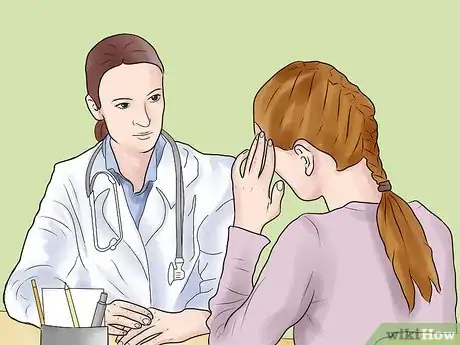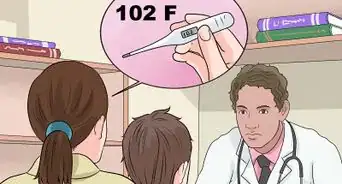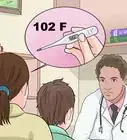This article was co-authored by Roy Nattiv, MD. Dr. Roy Nattiv is a Board-Certified Pediatric Gastroenterologist in Los Angeles, California. With over 20 years of experience he specializes in a broad range of pediatric gastrointestinal and nutritional illnesses such as constipation, diarrhea, reflux, food allergies, poor weight gain, SIBO, IBD, and IBS. He completed his pediatric residency at the Children’s Hospital at Montefiore, Albert Einstein College of Medicine in New York, and his fellowship at the University of California, San Francisco (UCSF). While at UCSF, he was a California Institute of Regenerative Medicine (CIRM) fellowship trainee and was awarded the North American Society for Pediatric Gastroenterology, Hepatology, and Nutrition (NASPGHAN) Fellow to Faculty Award in Pediatric IBD Research. Dr. Nattiv received his undergrad degree from the University of California, Berkeley, and his medical degree (MD) from the Sackler School of Medicine in Tel Aviv, Israel.
There are 8 references cited in this article, which can be found at the bottom of the page.
This article has been viewed 434,070 times.
Diarrhea happens when food and liquid you ingest pass through your system too quickly, resulting in watery, loose stools. This can be caused by a number of factors, including viruses, bacteria, medications, and certain foods. Since there are so many potential causes of diarrhea, identifying the right one can be tricky. If you want to know more about how to identify causes of diarrhea, keep reading.
Steps
Determining Whether You Have a Temporary Illness
-
1Determine whether you might have a virus. Viruses are a common cause of diarrhea that are passed from person to person through handshakes, shared utensils, and touching the same surfaces. Children attending school or going to daycare are at increased risk of getting a virus that can cause bacteria. If you or your child recently spent time in a public area trafficked by a lot of other people, you may have picked up a virus.
- Viral gastroenteritis is a viral infection in the small intestines and stomach. It has symptoms such as diarrhea, vomiting, abdominal cramps and nausea, which last approximately 3 days.
- Rotavirus is the most common virus contracted by kids that causes diarrhea.[1] Other symptoms include vomiting, abdominal pain, fever and nausea.
- See your doctor if you think a virus might be the cause of diarrhea.
-
2Assess the likelihood of having bacteria-related diarrhea. Bacteria that cause diarrhea are most commonly transferred to the body by way of food that hasn't been properly refrigerated or cleaned. Diarrhea caused by bacteria is a symptom of food poisoning.[2]
- Did you recently eat at a new restaurant or have food that tasted funny? Think back over your last few meals.
- Other symptoms of food poisoning include headache and vomiting. The illness usually resolves itself in a couple of days.
- If symptoms of food poisoning persists, see your doctor.
Advertisement -
3Determine whether you might have been exposed to a parasite. This common cause of diarrhea is usually contracted by ingesting dirty water. If you went swimming in a lake or river that might be contaminated, or drank water that wasn't clean, you might have picked up a parasite that is causing your symptoms.
- People who travel to foreign countries often experience this problem, but it usually goes away after 12 hours or so.[3]
- If your symptoms don't resolve in a day or two, see your doctor.
Considering Ongoing Medical Conditions
-
1Look into the possibility of irritable bowel syndrome (IBS). This is a very common cause of diarrhea and uncomfortable abdominal pain. It causes cramping and bloating as well, and can lead to the need to go to the bathroom more often than usual.[4]
- IBS can usually be managed by making changes to your diet and other lifestyle changes.
- IBS is exacerbated by stress. Determine whether this may be a factor for you.
-
2Determine whether you have inflammatory bowel disease. This disease causes the intestines to become inflamed, and the damage leads to bouts of diarrhea and other forms of discomfort. If you have chronic diarrhea, ask your doctor whether inflammatory bowel disease might be the problem.
-
3Ask your doctor about celiac disease. This results from an intolerance to gluten, a protein found in wheat, rye and barley. It causes fatigue, irritability, general malaise, and a host of other symptoms in addition to diarrhea. Talk to your doctor about whether this could be the problem at hand.[5]
-
4Assess whether your symptoms are related to another medical problem. Monitor symptoms you experience aside from diarrhea to assess whether something more serious may be at play.
- Medical conditions such as AIDS/HIV, Crohn's disease, hyperthyroidism, Addison's disease, and colon cancer cause diarrhea.
- Talk to your doctor about your symptoms to receive a diagnosis and treatment.
Examining Food and Medicine as Causes
-
1Ease up on foods often cause diarrhea. Be observant about what food you eat and figure out whether something in your daily diet might be irritating your system and causing these symptoms. If eliminating a certain food for a few days seems to make a difference, consider cutting back on it in the long term.
- Foods that lead to chronic gas, such as beans and other legumes, cabbage, broccoli, and nuts, may cause diarrhea if you're eating them in large quantities.
- Try eliminating caffeine from your diet. Caffeine stimulates the gastrointestinal system and leads to more frequent bowel movements.[6]
- Fats can also cause diarrhea, especially saturated fats found in fried food and snack foods.
- Artificial sweeteners found in soft drinks and candy cause diarrhea.
- Some people find red meat difficult to digest, so try cutting back on it.
- Alcohol can irritate the system and lead to diarrhea.
-
2Determine whether a new medication might be causing it. Starting new medications like quinidine, colchicine, antibiotics or nonsteroidal anti-inflammatory drugs (NSAIDs) can cause acute diarrhea. Taking too many laxatives can also lead to problems. Let your doctor know if you're on a medication that seems to be causing adverse symptoms.[7]
Expert Q&A
Did you know you can get expert answers for this article?
Unlock expert answers by supporting wikiHow
-
QuestionWhat is the most common cause of diarrhea in adults?
 Roy Nattiv, MDDr. Roy Nattiv is a Board-Certified Pediatric Gastroenterologist in Los Angeles, California. With over 20 years of experience he specializes in a broad range of pediatric gastrointestinal and nutritional illnesses such as constipation, diarrhea, reflux, food allergies, poor weight gain, SIBO, IBD, and IBS. He completed his pediatric residency at the Children’s Hospital at Montefiore, Albert Einstein College of Medicine in New York, and his fellowship at the University of California, San Francisco (UCSF). While at UCSF, he was a California Institute of Regenerative Medicine (CIRM) fellowship trainee and was awarded the North American Society for Pediatric Gastroenterology, Hepatology, and Nutrition (NASPGHAN) Fellow to Faculty Award in Pediatric IBD Research. Dr. Nattiv received his undergrad degree from the University of California, Berkeley, and his medical degree (MD) from the Sackler School of Medicine in Tel Aviv, Israel.
Roy Nattiv, MDDr. Roy Nattiv is a Board-Certified Pediatric Gastroenterologist in Los Angeles, California. With over 20 years of experience he specializes in a broad range of pediatric gastrointestinal and nutritional illnesses such as constipation, diarrhea, reflux, food allergies, poor weight gain, SIBO, IBD, and IBS. He completed his pediatric residency at the Children’s Hospital at Montefiore, Albert Einstein College of Medicine in New York, and his fellowship at the University of California, San Francisco (UCSF). While at UCSF, he was a California Institute of Regenerative Medicine (CIRM) fellowship trainee and was awarded the North American Society for Pediatric Gastroenterology, Hepatology, and Nutrition (NASPGHAN) Fellow to Faculty Award in Pediatric IBD Research. Dr. Nattiv received his undergrad degree from the University of California, Berkeley, and his medical degree (MD) from the Sackler School of Medicine in Tel Aviv, Israel.
Board Certified Gastroenterologist With adults, the most common cause of diarrhea by far is infectious. Most of the time it's self-limiting, but if it lasts for more than a few days, call your physician and ask for a stool test. Other causes might include a food allergy or intolerance, an autoimmune disease like celiac, or inflammatory bowel disease. Less common causes include diverticulitis or cancer.
With adults, the most common cause of diarrhea by far is infectious. Most of the time it's self-limiting, but if it lasts for more than a few days, call your physician and ask for a stool test. Other causes might include a food allergy or intolerance, an autoimmune disease like celiac, or inflammatory bowel disease. Less common causes include diverticulitis or cancer.
Warnings
- Immediately call your doctor when the diarrhea accompanies a fever greater than 101 degrees, bloody diarrhea or dehydration.⧼thumbs_response⧽
References
- ↑ http://www.cdc.gov/rotavirus/
- ↑ http://www.mayoclinic.org/diseases-conditions/food-poisoning/basics/definition/con-20031705
- ↑ https://www.aafp.org/afp/2004/0301/p1161.html
- ↑ https://aboutibs.org/signs-and-symptoms/ibs-with-diarrhea/
- ↑ https://celiac.org/about-celiac-disease/symptoms-of-celiac-disease/
- ↑ http://www.everydayhealth.com/digestive-health/ibs/living/8-foods-that-can-cause-diarrhea-and-indigestion.aspx
- ↑ https://my.clevelandclinic.org/health/diseases/4108-diarrhea
- ↑ Roy Nattiv, MD. Board Certified Gastroenterologist. Expert Interview. 18 December 2020.









-Step-12.webp)






















-Step-12.webp)





































Medical Disclaimer
The content of this article is not intended to be a substitute for professional medical advice, examination, diagnosis, or treatment. You should always contact your doctor or other qualified healthcare professional before starting, changing, or stopping any kind of health treatment.
Read More...